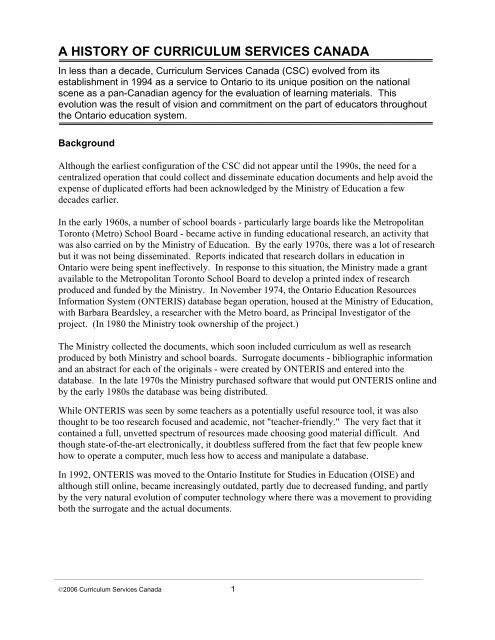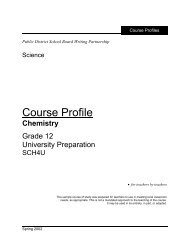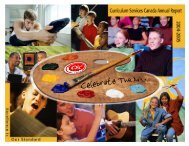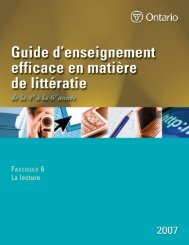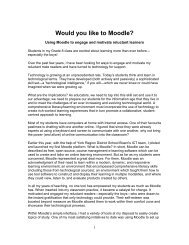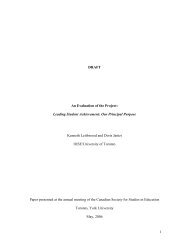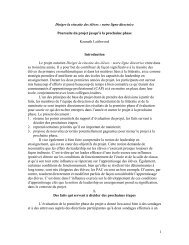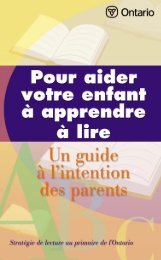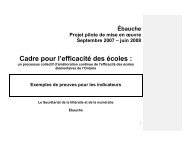a history of curriculum services canada
a history of curriculum services canada
a history of curriculum services canada
You also want an ePaper? Increase the reach of your titles
YUMPU automatically turns print PDFs into web optimized ePapers that Google loves.
A HISTORY OF CURRICULUM SERVICES CANADA<br />
In less than a decade, Curriculum Services Canada (CSC) evolved from its<br />
establishment in 1994 as a service to Ontario to its unique position on the national<br />
scene as a pan-Canadian agency for the evaluation <strong>of</strong> learning materials. This<br />
evolution was the result <strong>of</strong> vision and commitment on the part <strong>of</strong> educators throughout<br />
the Ontario education system.<br />
Background<br />
Although the earliest configuration <strong>of</strong> the CSC did not appear until the 1990s, the need for a<br />
centralized operation that could collect and disseminate education documents and help avoid the<br />
expense <strong>of</strong> duplicated efforts had been acknowledged by the Ministry <strong>of</strong> Education a few<br />
decades earlier.<br />
In the early 1960s, a number <strong>of</strong> school boards - particularly large boards like the Metropolitan<br />
Toronto (Metro) School Board - became active in funding educational research, an activity that<br />
was also carried on by the Ministry <strong>of</strong> Education. By the early 1970s, there was a lot <strong>of</strong> research<br />
but it was not being disseminated. Reports indicated that research dollars in education in<br />
Ontario were being spent ineffectively. In response to this situation, the Ministry made a grant<br />
available to the Metropolitan Toronto School Board to develop a printed index <strong>of</strong> research<br />
produced and funded by the Ministry. In November 1974, the Ontario Education Resources<br />
Information System (ONTERIS) database began operation, housed at the Ministry <strong>of</strong> Education,<br />
with Barbara Beardsley, a researcher with the Metro board, as Principal Investigator <strong>of</strong> the<br />
project. (In 1980 the Ministry took ownership <strong>of</strong> the project.)<br />
The Ministry collected the documents, which soon included <strong>curriculum</strong> as well as research<br />
produced by both Ministry and school boards. Surrogate documents - bibliographic information<br />
and an abstract for each <strong>of</strong> the originals - were created by ONTERIS and entered into the<br />
database. In the late 1970s the Ministry purchased s<strong>of</strong>tware that would put ONTERIS online and<br />
by the early 1980s the database was being distributed.<br />
While ONTERIS was seen by some teachers as a potentially useful resource tool, it was also<br />
thought to be too research focused and academic, not "teacher-friendly." The very fact that it<br />
contained a full, unvetted spectrum <strong>of</strong> resources made choosing good material difficult. And<br />
though state-<strong>of</strong>-the-art electronically, it doubtless suffered from the fact that few people knew<br />
how to operate a computer, much less how to access and manipulate a database.<br />
In 1992, ONTERIS was moved to the Ontario Institute for Studies in Education (OISE) and<br />
although still online, became increasingly outdated, partly due to decreased funding, and partly<br />
by the very natural evolution <strong>of</strong> computer technology where there was a movement to providing<br />
both the surrogate and the actual documents.<br />
©2006 Curriculum Services Canada 1


